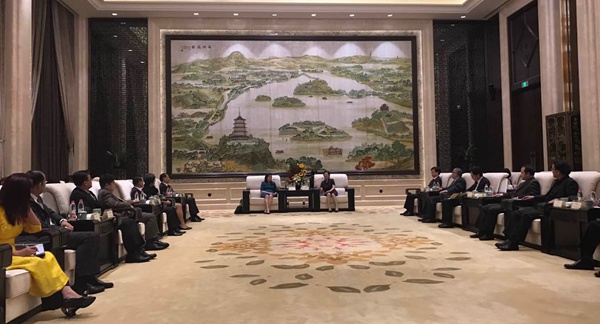
On 26 September 2017, H.E. Mme Liang Liming, Vice Governor of Zhejiang Provincial People’s Government, met with the delegation of “Diplomatic Officials of ASEAN Countries in China Embracing Zhejiang”. H.E. Ms. Magdalene Teo, Ambassador of Brunei Darussalam to China, H.E. Mr. Piriya Khempon, Ambassador of Thailand to China, H.E. Mr. Yu Hongyao, representative of China Public Diplomacy Association (CPDA) and former Ambassador of China to Mongolia and the Maldives, H.E. Mme. Yang Xiuping, Secretary-General of ASEAN-China Centre(ACC), Mr. Tean Samnang, Consul-General of Cambodia in Shanghai, Mr. Ong Chong Hang, Acting Consul-General of Singapore in Shanghai, and representatives from Embassies and Consulates-General of Cambodia, Indonesia, Malaysia, Myanmar, the Philippines and Viet Nam, as well as Mr. Chen Zongyao, Deputy Secretary-General of Zhejiang Provincial People’s Government, and Mr. Gu Jianxin, Deputy Director-General of Department of Foreign and Overseas Chinese Affairs of Zhejiang Provincial People’s Government, attended the event.
Vice Governor Liang Liming welcomed the distinguished guests and briefed on the current economic and social development in Zhejiang. She said that in 2016, the total GDP in Zhejiang province reached RMB 4.7 trillion, ranking the 4th in China, and other economic indicators are at the forefront of the country. The GDP growth rate in the first half of this year reached 8%. In order to achieve overall development goals, “Five-Pronged Overall Plan” and “Four Comprehensives” strategy, set by the central government, Zhejiang province is going to create new advantages by reforming and opening the province as well as focusing on innovation and human resources. On one hand, the government will remain committed to economic development, further promoting the structural reform of the supply-side, and fostering new industries, new business models and new formats such as cross-border e-commerce, characteristic towns and so on. On the other hand, the government will continue to strengthen its own reform, pay more attention to technical innovation, promote “one-stop office”, and integrate government resources to better serve enterprises and the people. Zhejiang province will firmly follow the “double eight strategy” proposed by President Xi Jinping to achieve comprehensive and coordinated development of economy, science and technology, ecology, human resources, rule of law, public security, and other areas. She spoke highly of the important roles played by ASEAN Ambassadors in promoting bilateral cooperation. She added that Zhejiang province and ASEAN countries have established friendly relations. Seventeen pairs of cities have established Sister-City relations. In 2016, Zhejiang’s volume of trade with 10 ASEAN countries had reached USD 33.3 billion. Zhejiang expects to work with the local governments of ASEAN countries to promote policy coordination, facility connectivity, unimpeded trade, financial integration and people-to-people bond in order to learn from each other, create mutual benefits and win-win results under the Belt and Road framework.
On behalf of ASEAN side, H.E. Ms. Magdalene Teo, Ambassador of Brunei Darussalam to China, thanked Vice Governor Liang Liming for sparing time to meet the delegation, the government of Zhejiang province for the warm and thoughtful arrangements, as well as ACC and CPDA for their hard work. Ambassador Magdalene Teo said that the trip was meaningful and interesting. The delegation not only enjoyed the beautiful scenery of Hangzhou, appreciated the excellent works of the artists, but also got impressed by great achievements in economic and social development, scientific and technological innovation and so on through visiting the well-known enterprises, and listening to the briefing of Vice Governor Liang Liming in particular. In the future, ASEAN countries have great potential to cooperate with Zhejiang. ASEAN countries are willing to deepen their communication with Zhejiang, and further strengthen bilateral cooperation in scientific and technological innovation, e-commerce, port connectivity, culture and education for the benefits of the two sides’ peoples.
?